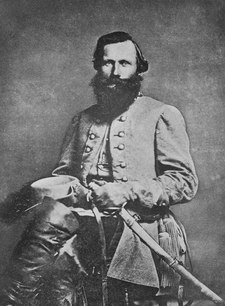JEB Stuart
| J. E. B. Stuart | |
|---|---|
 |
|
| Birth name | James Ewell Brown Stuart |
| Nickname(s) | "Jeb", "Beauty", "Knight of the Golden Spurs", "J.E.B." |
| Born |
February 6, 1833 Patrick County, Virginia |
| Died | May 12, 1864 (aged 31) Richmond, Virginia |
| Buried at | Hollywood Cemetery |
| Allegiance |
|
| Service/branch |
|
| Years of service | 1854–1861 (USA) 1861–1864 (CSA) |
| Rank |
|
| Commands held |
1st Virginia Cavalry Cavalry Corps, Army of Northern Virginia |
| Battles/wars | |
| Signature | |
Bleeding Kansas
American Civil War
James Ewell Brown "Jeb" Stuart (February 6, 1833 – May 12, 1864) was a United States Army officer from the U.S. state of Virginia, who later became a Confederate States Army general during the American Civil War. He was known to his friends as "Jeb", from the initials of his given names. Stuart was a cavalry commander known for his mastery of reconnaissance and the use of cavalry in support of offensive operations. While he cultivated a cavalier image (red-lined gray cape, yellow sash, hat cocked to the side with an ostrich plume, red flower in his lapel, often sporting cologne), his serious work made him the trusted eyes and ears of Robert E. Lee's army and inspired Southern morale.
Stuart graduated from West Point in 1854, and served in Texas and Kansas with the U.S. Army. He was a veteran of the frontier conflicts with Native Americans and the violence of Bleeding Kansas, and he participated in the capture of John Brown at Harpers Ferry.
He resigned when his home state of Virginia seceded to serve in the Confederate Army, first under Stonewall Jackson in the Shenandoah Valley, but then in increasingly important cavalry commands of the Army of Northern Virginia, playing a role in all of that army's campaigns until his death. He established a reputation as an audacious cavalry commander and on two occasions (during the Peninsula Campaign and the Maryland Campaign) circumnavigated the Union Army of the Potomac, bringing fame to himself and embarrassment to the North. At the Battle of Chancellorsville, he distinguished himself as a temporary commander of the wounded Stonewall Jackson's infantry corps.
...
Wikipedia
